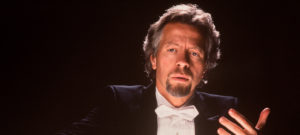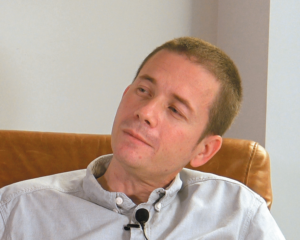
Both Hands – Conductor Thomas Conlin on His Passion for Mozart, Opera vs. Symphonic Concerts, & Modern Composers
By Dejan VukosavljevicYoung Thomas Conlin was very exciting about his first contact with the classical music. His parents bought a piano for him, and he wasn’t able to resist the temptation.
“When I was five-years-old my father won a piano in a contest,” Conlin reminisced in a recent interview with OperaWire. “From the day the piano was delivered I couldn’t keep my hands off it! I would often sneak downstairs in the middle of the night and experiment with chords and pick out tunes. I couldn’t stay away from that piano, though my parents eventually attached a lock to the keyboard cover so they could get some sleep at night. However, they did encourage me to play in the daytime and they signed me up with a piano teacher.”
Then, he realized he was hooked, deeply attached to this beautiful world, and he started to actually make music.
“My musical curiosity knew no bounds! All through my formative years I organized classmates into musical ensembles, mostly to play jazz and rock ‘n’ roll, though we sometimes played classical music. I was concertmaster of my high orchestra and played bassoon in the band.”
But then, something exciting happened. The young man started creating new pieces of music.
“I composed music in all styles and even wrote a symphony which was performed by my high school orchestra. At the age of 14 I became organist and choirmaster at St. Michael’s Episcopal Church in Arlington, Virginia.”
Musical Education
That had already been a pretty good start for Conlin, but from that moment on, he knew that he needed more musical education in order to reach his full potential.
One of the major mentors during his teens was Adolph Torovsky, composer of many protestant hymns and organist at the Church of the Epiphany in Washington DC.
“One day Torovsky gave me a ticket to hear the Boston Symphony on tour. My parents had taken me to National Symphony concerts for children and to performances by the Washington Opera and the National Ballet, but that Boston Symphony concert was a real milestone in my musical life,” Conlin recalled.
The music that he heard moved him deeply and thoroughly.
“When I heard those rippling woodwinds at the start of Ravel’s 2nd Suite from ‘Daphnis et Chloé,’ I had the same feeling a young boy has when given a mechanical toy and he wants to take it apart to see how it works! I was fascinated and knew then that I wanted to be involved in this magic,” adds Conlin.
From then on, Conlin would turn to conducting. He found conducting a very enthralling endeavor and grabbed the opportunity with both hands.
Both Hands
His career as a conductor has taken him to five continents where he has collaborated with such orchestras as the Philharmonisches Orchester Augsburg, Baden-Badener Philharmonie and Philharmonisches Orchester der Stadt Ulm in Germany, the Brazilian Symphony Orchestra in Rio de Janeiro, Cairo Symphony Orchestra, Volgograd Symphony Orchestra, Presidential Symphony Orchestra Ankara, Izmir State Symphony Orchestra, as well as the Nagoya Philharmonic Orchestra and the Tokyo Chamber Orchestra.
In engaging with the career, he has really come to an understanding of the great challenges as both a person and a musician. Conducting is all-encompassing requiring not only complete dedication physically but also emotionally.
“The physical aspects of conducting offer a number of health benefits, including terrific cardio-vascular massage, sustained raising of the pulse, and the burning of lots of calories. One must be in pretty good shape to conduct any of the many three- or four-hour operas in the repertoire. But I think a more likely explanation for the fact that conductors generally live long lives and retire late has to do with the emotional connection to one’s work. It’s just not possible to ‘phone it in;’ one must always be ‘in the moment,’ and that generates a great deal of satisfaction. And it’s very revitalizing to be surrounded by committed colleagues and beautiful music!”
When it comes to evaluating the different challenges of conducting operas or symphonic concerts, Conlin noted that opera may be more difficult overall.
“A famous conductor once said that a passable performance of ‘La bohème’ is harder to achieve than a perfect performance of a Beethoven symphony – or words to that effect,” Conlin noted. “This is not because opera conducting takes a higher degree of musicianship than symphonic conducting, but because the technical demands are much greater and because one has constantly to balance leading and following.
“So many things change in performance owing to the constantly changing distance between the conductor and the singers, who often are moving about while singing. Additionally, pacing in an opera performance frequently has as much to do with the drama as with musical values. At rehearsals for a symphonic concert, I work with a very definite concept of how I want a composition to sound. In opera there is much more give-and-take between conductor and singers, and there is also the collaboration with the director.”
The learning process is not an easy one, too. It takes lots of time, passion and dedication to achieve mastery in the field of leading musical forces during the performance of a concert, or an opera.
Technique is also a very important piece of a puzzle for any conductor.
“I don’t know of any colleagues who, with no previous experience, signed up for a conducting course and emerged as conductors! I had some excellent teachers – Leonard Bernstein, Seiji Ozawa, Erich Leinsdorf among them – but I honed my conducting technique mainly by observing others – what worked and what didn’t – and by trial-and-error. As a rehearsal pianist under Karajan and other great conductors, I began to realize that I was responding as much to the force of their ideas as to their actual conducting technique,” Conlin elaborated.
Also, learning and performing new operas is a massive challenge for every conductor. Conlin likes to make a connection to the symphonic work in this case.
“Preparing an opera for the first time is no different from preparing a new (to me) symphonic work,” the conductor explained. “I begin with the big picture and work my way down to the smallest details. I like to research the lives and times of the composers whose work I’m performing.”
“As a young conductor I would sometimes rehearse gestures in front of a mirror (really!), but I soon abandoned that sort of preparation as I discovered that the gestures required to elicit a particular response from my orchestra unfolded naturally from the music.”
In addition to his dedicated work as a conductor, Thomas Conlin also served as vocal coach for many artists currently on the rosters of San Francisco Opera, Lyric Opera of Chicago and the Metropolitan Opera House. He sees this experience as both deeply moving and challenging.
“There is absolutely no better way for a budding conductor to learn about the essentials of music than by accompanying singers. By ‘essentials,’ I mean phrasing, legato, rubato, the breath, the shaping of a melody – all the elements that bring music to life,” Conlin added. “I’ve learned more about music – and conducting! – from singers and instrumentalists with whom I’ve collaborated than from any classes or text books. And the give-and-take in accompanying singers is a microcosm of what happens onstage and in the orchestra pit in an opera production.”
Mozart & The Modern
Performing Mozart’s timeless music is both a huge pleasure and a huge challenge. Thomas Conlin prepared and presented the American premiere and the first staged performance in modern times of Mozart’s early opera “Lucio Silla,” an experience he will never forget.
“Mozart occupies a very special place in my musical universe. I’ve studied and performed a great deal of his music. I know that I’m dealing with a truly great piece of music when, reviewing a work that I’ve performed many times, I discover things in the score that I’d not noticed before,” he emphasized. “This happens every time I re-study ‘Le Nozze di Figaro’ or ‘Così fan tutte.’
Mozart composed Lucio Silla at the age of 16 for the Teatro Regio Ducal in Milan, where it was considered a moderate success. The premiere was followed by occasional concert performances in Europe. However, it wasn’t until Conlin’s performance with the Chamber Opera Society of Baltimore in 1967 that the opera managed a fully staged presentation.
“I vividly remember, standing backstage while the orchestra tuned, the feeling that came over me at the thought that the conductor at the last staged performance was Mozart,” Conlin enthused.
In addition to the well-known and popular classical works, Thomas Conlin finds a sanctuary in the contemporary music as well. For those purposes he founded the Snowshoe Music Festival in the Appalachian mountains. And he also finds that the experience of performing classical music outdoors is a wonderful one.
“There’s something magical about classical music performed outdoors! I’ll take the occasional outdoor chirping bird over flu-season coughing in a concert hall any day! Of course, this assumes an appropriate setting, preferably one that requires minimal amplification. As music director, I’ve done my share of ‘pops’ concerts, but I don’t believe that an informal setting should alter one’s commitment to great music. At Snowshoe and other such festivals I’ve always had wonderful response to concerts devoted to the classics and to contemporary music.”



